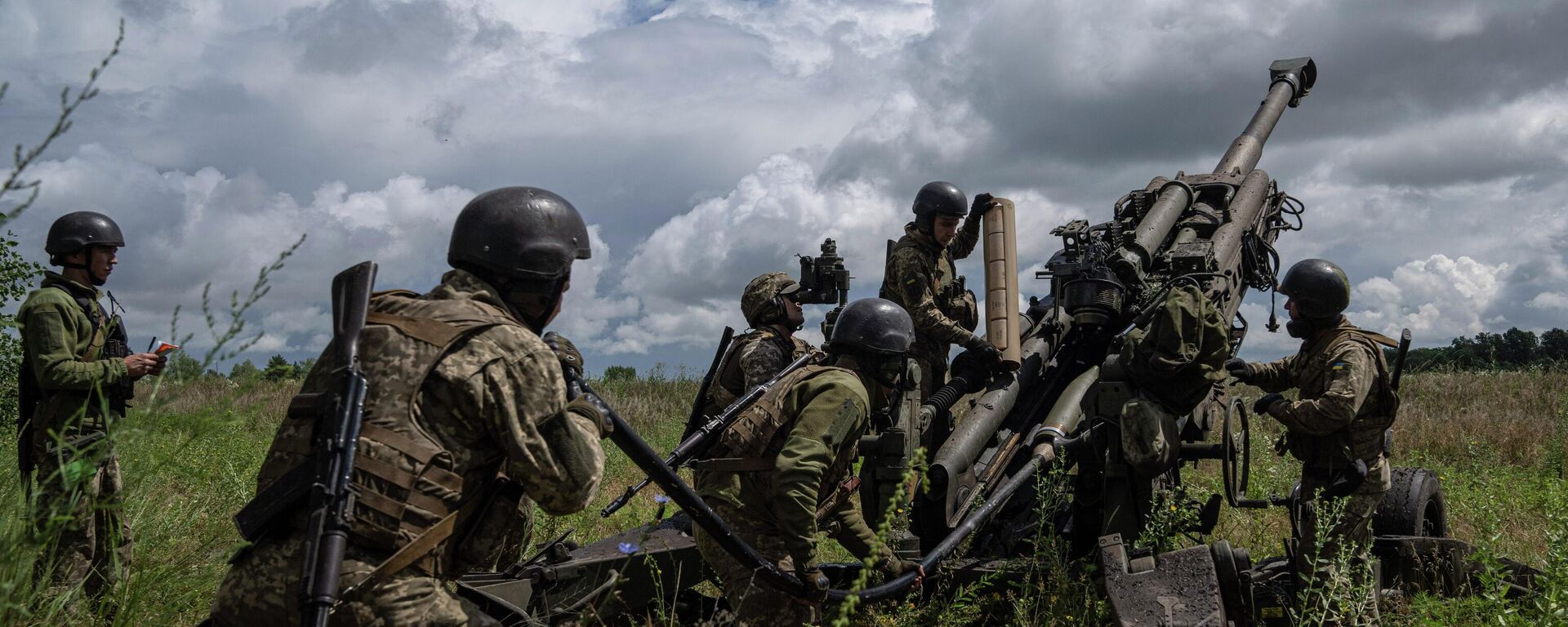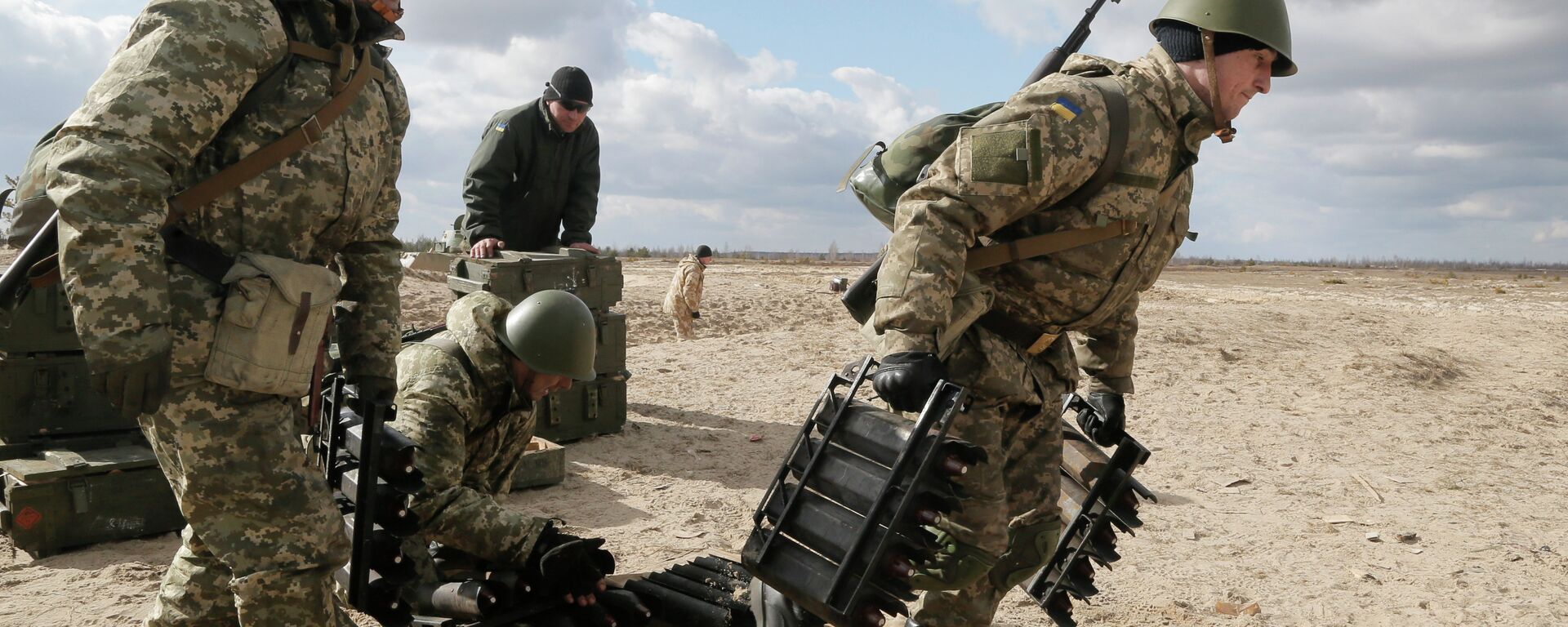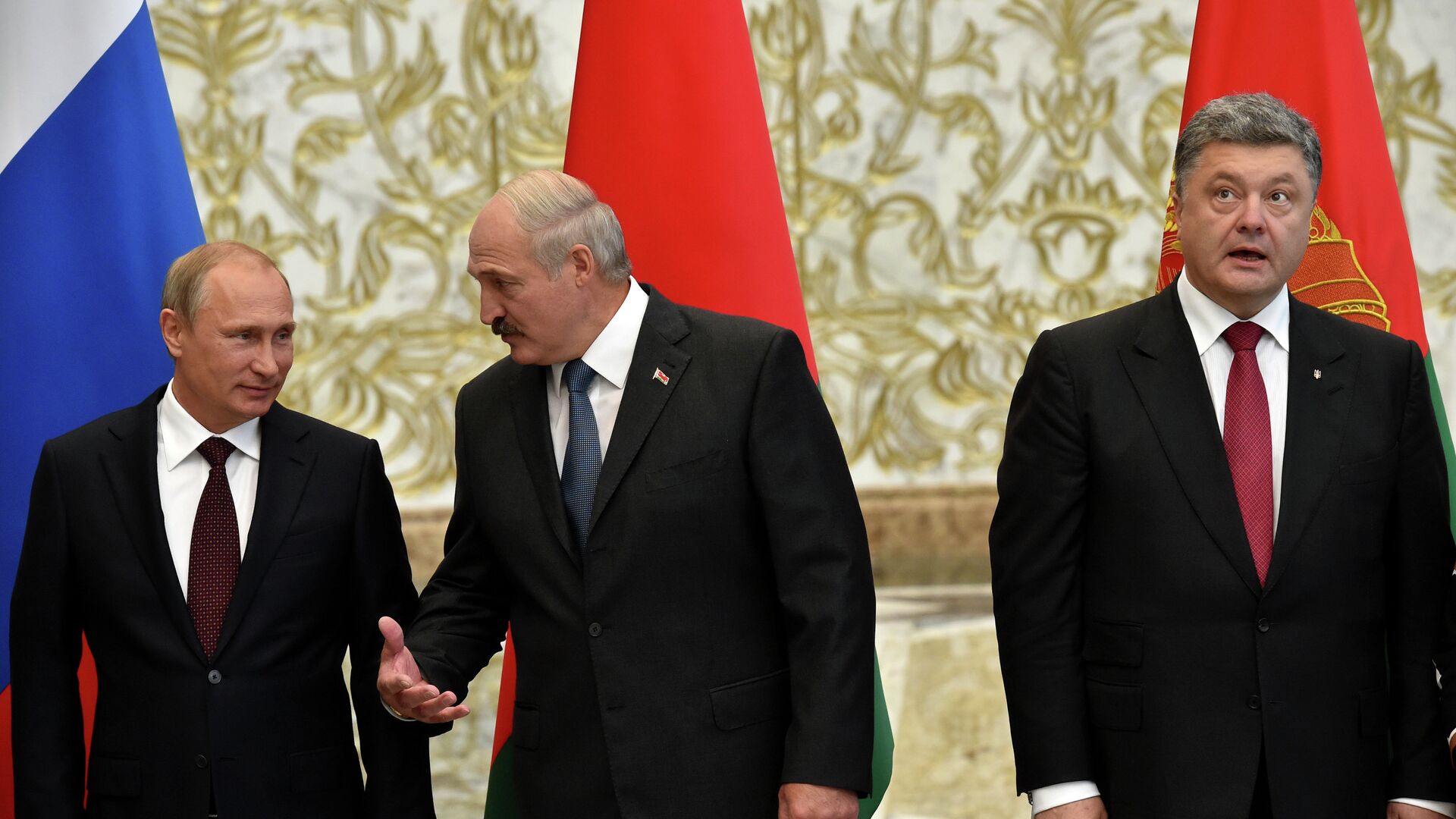https://sputnikglobe.com/20230131/minsk-agreements-were-a-ruse-that-gave-kiev-time-to-rearm-ukraines-ex-president-admits-1106856464.html
Minsk Agreements Were a Ruse That Gave Kiev Time to Rearm, Ukraine’s Ex-President Admits
Minsk Agreements Were a Ruse That Gave Kiev Time to Rearm, Ukraine’s Ex-President Admits
Sputnik International
The admission confirms suspicions expressed last March by Viktor Yanukovych, the former Ukrainian president ousted in a Washington-backed coup in 2014, that Kiev and its American masters were responsible for the failure of the Minsk Peace Agreements and the escalation of the Donbass crisis into a full-blown Russia-Ukraine conflict.
2023-01-31T13:27+0000
2023-01-31T13:27+0000
2023-01-31T13:27+0000
russia's special operation in ukraine
ukraine
donbass
petro poroshenko
minsk agreements
peace deal
sham
fraud
farce
https://cdn1.img.sputnikglobe.com/img/102051/86/1020518642_0:0:4617:2598_1920x0_80_0_0_60d7f47901f9027ba469280c8c040f3d.jpg
The February 2015 Minsk peace deal was just a sham that gave Ukraine’s post-Maidan coup authorities time to rearm and create an anti-Russia coalition, former President Petro Poroshenko has admitted.“This document gave Ukraine eight years for building up [its] army, for building up [the] economy, and for building up [a] global pro-Ukrainian, anti-Putin coalition,” Poroshenko said in a BBC documentary entitled “Putin vs. the West.”For his part, Munich Security Conference chairman Christoph Heusgen, a one-time security advisor to former German Chancellor Angela Merkel, revealed that Poroshenko had worriedly informed Berlin about the sorry state of Ukrainian forces fighting in Donbass after local militias inflicted a major defeat on them in the city of Debaltsevo in the winter of 2015, leaving Ukrainian lines on the brink of total collapse.Russian Foreign Minister Sergey Lavrov did not mince words in commenting on Poroshenko’s confession. “We, at the request of our Egyptian friends, provided them with detailed information on events related to the special military operation in Ukraine, about the long years of sabotage of the Minsk Agreements that preceded the current situation, and which were actively used by the Ukrainian regime and Western countries that nurtured this regime to prepare for a war against Russia,” Lavrov said, speaking to reporters alongside Egyptian Foreign Minister Sameh Shoukry in Moscow on Tuesday.“[These preparations] have been openly confessed to by those who signed the Minsk Agreements, former Ukrainian President Poroshenko, the former leaders of France and Germany, Mr. Hollande and Mrs. Merkel,” Lavrov said. Now, he added, NATO is “directly involved in a hybrid war against Russia” in Ukraine.This is the second time Poroshenko openly admitted that the Minsk deal was a sham. In November, the former president told a pair of pranksters posing as the former US ambassador to Russia that he “needed these Minsk Accords to get at least four years to form the Ukrainian Armed Forces, build up the Ukrainian economy and train the Ukrainian military together with NATO to create the best armed forces in Eastern Europe.”Along with Poroshenko, Angela Merkel and former French President Francois Hollande have also come forward to admit that Minsk was a ploy, not a genuine desire to reach peace in Donbass.Last month, Merkel told reporters that “the 2014 Minsk Agreement was an attempt to buy time for Ukraine,” and that Kiev “used this time to become stronger, as you can see today.”Separately, Hollande similarly revealed that even though Russia had honestly met its obligations as a guarantor to the deal, the agreement was never about reaching a lasting peace. “Since 2014, Ukraine has strengthened its military posture. Indeed, the Ukrainian army [of 2022] was completely different from that of 2014. It was better trained and equipped. It is the merit of the Minsk Agreements to have given the Ukrainian Army this opportunity,” Hollande said.President Putin, who also signed the agreements, expressed surprise at the chancellor’s candor, saying he “did not expect to hear such a thing” from her, because he “always proceeded from the idea that the German leadership behaves sincerely with us.”Belarusian President Alexander Lukashenko, who hosted the peace negotiations in the Belarusian capital in 2015, called Merkel’s remarks “not just disgusting,” but “abominable,” and slammed the former chancellor for acting “in a petty, obnoxious way.”What Were the Minsk Agreements and Why Did They Fail?The Minsk Peace Agreements were a thirteen-point ceasefire and peace deal signed by Ukraine and guaranteed by Russia, Germany and France designed to allow Kiev to restore its control over the regions of Donetsk and Lugansk, in exchange for constitutionally-mandated autonomy. Kiev stalled on the implementation of the agreement’s political elements, while Donbass forces on the contact line accused the Ukrainian military of shelling and sniper attacks, and the illegal deployment of heavy military equipment in the buffer zone.Late last year, at a meeting with the mothers of Russian servicemen taking part in the military operation in Ukraine, President Putin said Moscow proceeded “sincerely” from the idea that peace in Donbass could have been achieved through the Minsk deal, but now, with the benefit of hindsight, “it has become obvious that this reunification should have happened earlier,” in 2014, before NATO had gotten its claws into Ukraine.
https://sputnikglobe.com/20230130/russias-deputy-foreign-minister-says-us-main-beneficiary-of-ukraine-crisis-1106805536.html
https://sputnikglobe.com/20221208/the-minsk-agreements-explained-1105193250.html
ukraine
donbass
Sputnik International
feedback@sputniknews.com
+74956456601
MIA „Rossiya Segodnya“
2023
News
en_EN
Sputnik International
feedback@sputniknews.com
+74956456601
MIA „Rossiya Segodnya“
Sputnik International
feedback@sputniknews.com
+74956456601
MIA „Rossiya Segodnya“
minsk peace deal, minsk peace agreement, minsk peace, petro poroshenko, vladimir putin, angela merkel, francois hollande, peace agreement, peace, donbass, ukraine, russia
minsk peace deal, minsk peace agreement, minsk peace, petro poroshenko, vladimir putin, angela merkel, francois hollande, peace agreement, peace, donbass, ukraine, russia
Minsk Agreements Were a Ruse That Gave Kiev Time to Rearm, Ukraine’s Ex-President Admits
The admission confirms suspicions expressed last March by Viktor Yanukovych, the former Ukrainian president ousted in a Washington-backed coup in 2014, that Kiev and its American masters were responsible for the failure of the 2015 Minsk Peace Agreements and the escalation of the Donbass crisis into a full-blown Russia-Ukraine conflict.
The February 2015 Minsk peace deal was just a sham that gave Ukraine’s post-Maidan coup authorities time to rearm and create an anti-Russia coalition, former President Petro Poroshenko has admitted.
“This document gave Ukraine eight years for building up [its] army, for building up [the] economy, and for building up [a] global pro-Ukrainian, anti-Putin coalition,” Poroshenko said in a BBC documentary entitled “Putin vs. the West.”
For his part, Munich Security Conference chairman Christoph Heusgen, a one-time security advisor to former German Chancellor Angela Merkel, revealed that Poroshenko had worriedly informed Berlin about the sorry state of Ukrainian forces fighting in Donbass after local militias inflicted a major defeat on them in the city of Debaltsevo in the winter of 2015, leaving Ukrainian lines on the brink of total collapse.
Russian Foreign Minister Sergey Lavrov did not mince words in commenting on Poroshenko’s confession. “We, at the request of our Egyptian friends, provided them with detailed information on events related to the special military operation in Ukraine,
about the long years of sabotage of the Minsk Agreements that preceded the current situation, and which were actively used by the Ukrainian regime and Western countries that nurtured this regime to prepare for a war against Russia,” Lavrov said,
speaking to reporters alongside Egyptian Foreign Minister Sameh Shoukry in Moscow on Tuesday.
“[These preparations] have been openly confessed to by those who signed the Minsk Agreements, former Ukrainian President Poroshenko, the former leaders of France and Germany, Mr. Hollande and Mrs. Merkel,” Lavrov said. Now, he added, NATO is “directly involved in a hybrid war against Russia” in Ukraine.

30 January 2023, 04:15 GMT
This is the second time Poroshenko
openly admitted that the Minsk deal was a sham. In November, the former president told a pair of pranksters posing as the former US ambassador to Russia that he
“needed these Minsk Accords to get at least four years to form the Ukrainian Armed Forces, build up the Ukrainian economy and train the Ukrainian military together with NATO to create the best armed forces in Eastern Europe.”Along with Poroshenko, Angela Merkel and former French President Francois Hollande have also come forward to admit that Minsk was a ploy, not a genuine desire to reach peace in Donbass.
Last month, Merkel
told reporters that “the 2014 Minsk Agreement was an attempt to buy time for Ukraine,” and that Kiev “used this time to become stronger, as you can see today.”
Separately, Hollande similarly
revealed that even though Russia had honestly met its obligations as a guarantor to the deal, the agreement was never about reaching a lasting peace. “Since 2014, Ukraine has strengthened its military posture. Indeed, the Ukrainian army [of 2022] was completely different from that of 2014. It was better trained and equipped. It is the merit of the Minsk Agreements to have given the Ukrainian Army this opportunity,” Hollande said.
President Putin, who also signed the agreements, expressed surprise at the chancellor’s candor, saying he “did not expect to hear such a thing” from her, because he “always proceeded from the idea that the German leadership behaves sincerely with us.”
Belarusian President Alexander Lukashenko, who hosted the peace negotiations in the Belarusian capital in 2015, called Merkel’s remarks “not just disgusting,” but “abominable,” and slammed the former chancellor for acting “in a petty, obnoxious way.”
What Were the Minsk Agreements and Why Did They Fail?
The Minsk Peace Agreements were a
thirteen-point ceasefire and peace deal signed by Ukraine and guaranteed by Russia, Germany and France designed to allow Kiev to restore its control over the regions of Donetsk and Lugansk, in exchange for constitutionally-mandated autonomy. Kiev stalled on the implementation of the agreement’s political elements, while Donbass forces on the contact line accused the Ukrainian military of shelling and sniper attacks, and the illegal deployment of heavy military equipment in the buffer zone.
Late last year, at a meeting with the mothers of Russian servicemen taking part in the military operation in Ukraine, President Putin said
Moscow proceeded “sincerely” from the idea that peace in Donbass could have been achieved through the Minsk deal, but now, with the benefit of hindsight, “it has become obvious that this reunification should have happened earlier,” in 2014, before NATO had gotten its claws into Ukraine.

8 December 2022, 19:04 GMT




